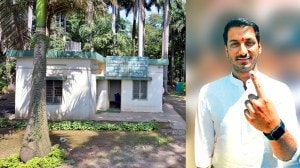Kuwait wakes up to a crisis of (in)security
On the surface, Kuwait looks no different from the way it did a year ago. Its American-style malls are still bustling, its dreary boulevards...

On the surface, Kuwait looks no different from the way it did a year ago. Its American-style malls are still bustling, its dreary boulevards still teeming with luxury cars and jewelry-laden women. It still projects an image as one of the most stable, pro-Western countries in the region, and Kuwaitis still express gratitude for the US expulsion of Saddam Hussein’s army in 1991.
About the only hint of the crisis overtaking this country of 1 million citizens and as many foreign workers are the concrete barriers being installed around official buildings and the police officers’ bulletproof vests and heavy weapons. But talk to Kuwaitis these days, and the first topic they are likely to bring up is the threat of terrorism.
Since mid-January, a series of gun battles and confrontations between Kuwaiti security forces and people believed to be Islamic militants has shaken this tiny city-state. Long focused on threats from outside, Kuwaitis have in recent weeks grappled with a new threat from within. Long-concealed tensions between Islamic politicians and pro-Western liberals have burst into the open.
“This was the first time that a Kuwaiti killed another Kuwaiti for political reasons,” Saad bin Tefla, a liberal commentator, said of the firefights. “No election, no political or public event has ever been marred by blood in the modern history of this country.”
Events here mirror those in neighboring Saudi Arabia over the past two years, where about 100 Westerners, Saudis and others have been killed.
Analysts say the crisis caught the government off guard at a critical moment. With the emir, Sheik Jaber al-Ahmad al-Sabah, ailing and his 73-year-old crown prince and heir, Sheik Saad al-Abdullah al-Sabah, also suffering health problems, the royal family has been rife with questions of succession. In 2001, Jaber had a brain hemorrhage, from which he is said to have recovered, but the emir has fallen from public sight and has stopped attending most official functions. Many duties are now left to his half-brother, who is also the prime minister, Sheik Sabah al-Ahmad al-Sabah.
“There’s a power vacuum, and people in the press and in Parliament feel it,” said Ahmad Bishara, leader of a liberal party. “You have a disabled leadership and a prime minister who’s the de facto ruler but with little experience in internal politics.”
With both sides trying to enter the void, the violence has been a stern warning of the power Islamists have in Kuwait, liberals say. Islamists in Parliament and in ministries are culpable for cultivating an environment in which militancy could grow, they contend.
Mansour al-Khuzam, deputy secretary of a new Islamist-dominated party called the Ummah Party, sees the issue differently. He attributes the violence to a fundamental inequity and injustice in the society, encouraged by vested interests. Despite the seeming democracy of Kuwait’s Parliament, he said, people are largely voiceless and need greater freedom to express themselves and determine their leadership.



- 01
- 02
- 03
- 04
- 05




























